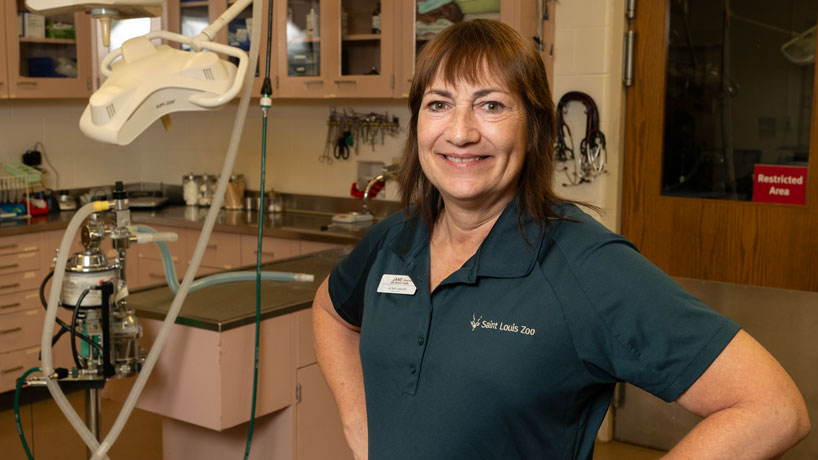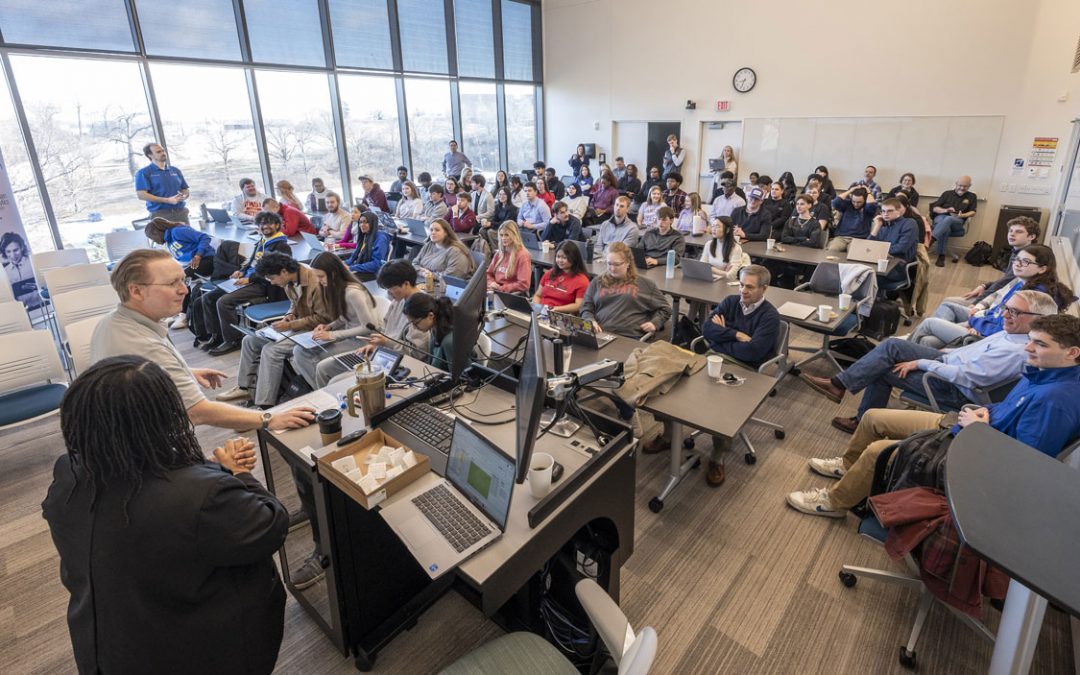
Jane Merkel spent nearly three decades at the Saint Louis Zoo, starting as a veterinary technician and working her way up to her current role as zoological manager of animal health. (Photo by Derik Holtmann)
Hometown: St. Louis
Major: BS in biology, 2003; MS in biology, 2007
Current position: Zoological Manager of Animal Health at the Saint Louis Zoo
Fun fact: Merkel has made many trips to the Galápagos Islands to conduct research.
No two days are ever the same when Jane Merkel walks into work at the Endangered Species Research Center & Veterinary Hospital at the Saint Louis Zoo. She could find herself assisting with a surgery on a bushmaster snake, taking X-rays on an injured penguin or even drawing blood while treating a tarantula.
“We work with everything from frogs to elephants, and that is what makes it amazing,” says Merkel, who has spent nearly three decades at the zoo, starting as a veterinary technician and working her way up to her current role as zoological manager of animal health.
Her love of animals, including a particular fascination with frogs as a child, drew her to the profession. She earned an associate degree from Jefferson College’s Veterinary Technology Program before getting hired at the zoo in 1994. As Merkel settled into her early work, she kept finding herself wanting to learn more.
“I wanted to be a better-educated woman,” Merkel says. “After interacting with many of the people here, I just wanted to further my education and learn more about the world in general, but specifically about science.”
That led her to enroll in evening classes to pursue her bachelor’s degree at the University of Missouri–St. Louis. She balanced the responsibilities of her full-time job and school for several years before completing her degree in 2003. By then, Merkel had also met Patricia Parker, then UMSL’s E. Desmond Lee Endowed Professor of Zoological Studies and a senior scientist at the zoo, who encouraged her to continue her learning.
She had an opportunity to join Parker on one of her many trips to the Galápagos Islands, where Parker was researching the prevalence of avian malaria and other pathogens in the islands’ native wildlife, including Galápagos penguins and cormorants. She eventually enrolled in UMSL’s master’s program and began doing research in Parker’s lab, earning her degree in 2007. She received support from UMSL’s Whitney R. Harris World Ecology Center along the way.
Merkel has seen the zoo place a greater emphasis on scientific research over the past 30 years, particularly with the establishment of the Saint Louis Zoo WildCare Institute in 2004 and its continued growth in the years since. In addition to the Galápagos, she has had the opportunity to do field research in Malawi, Madagascar and Peru.
But the bulk of her time has been spent on-site, tending to the health of the zoo’s more than 700 species of animals.
“I always tell people that I am probably the luckiest person I’ll ever know – to be able to have a job that I love this much and to be able to travel and work with the animals but also the people that I work with is amazing,” Merkel says. “I have been able to know people from all over the world, and that’s just a wonderful thing.”
This story was originally published in the fall 2023 issue of UMSL Magazine. If you have a story idea for UMSL Magazine, email magazine@umsl.edu.














